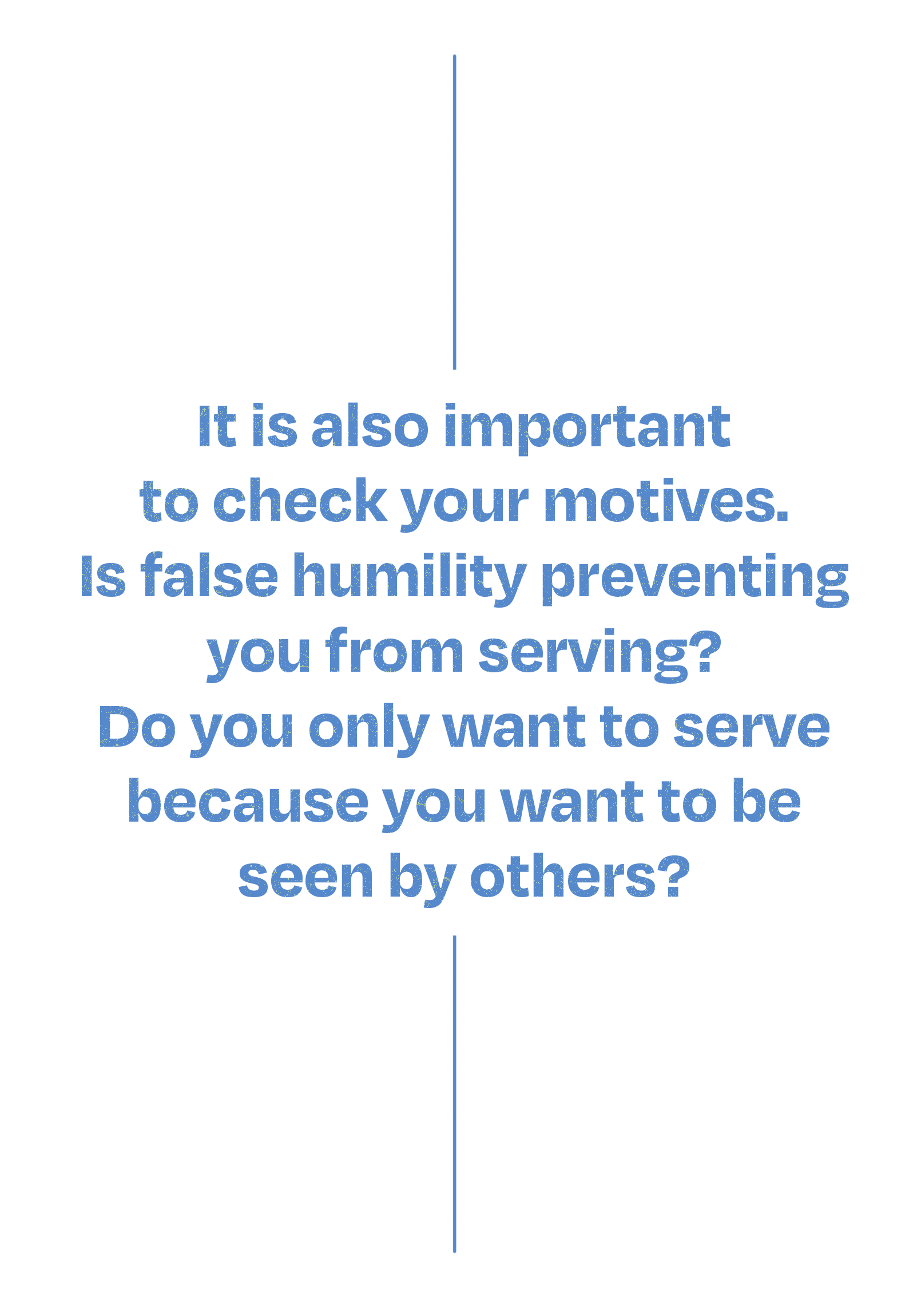Relationships

Studies & NS

Culture

What if I desire to serve in church, but I have don’t have the skills for the role or I’m just not very good at the task? Is having the heart to serve enough?
I believe when it comes to serving, the heart is definitely very important, but serving is not all heart and no skill.
If you’re interested to serve, the first question to ask yourself is, “What am I interested in? What is my passion? What is my burden?”
We should serve according to our gifts, experiences and our abilities.
But where that comes together collectively and cohesively is usually hard to figure out in the beginning and especially for youths.
As an adult, as you’re surer of yourself, this process is easier. But as a youth, you’re usually exploring and I think that is okay. In such situations, skills are not so critical.
What am I interested in? What is my passion? What is my burden?
I would recommend that if you are interested to serve in ministry, you can start by approaching your pastor or leader and share with them your life story and experiences.
Maybe from there they can help you identify where you might be best suited to serve.
In most instances I think it would also be natural for the pastors to think about what are the gaps in the church that require people to serve, and find some sort of marriage between these needs and the people that are available to serve.
Thus in such scenarios, the heart to serve is prioritised over “skill”.
Personally, I look for two things: availability and commitment.
There’s a very common sports saying that goes: “The greatest ability is availability”.
You can be the best soccer player in the world, but if you’re always injured and hence unavailable, you can’t do anything or contribute in any particular way.
So the first thing is that you have to be available, you have to be in church and a part of the community. You have to have time and be available to serve.

Following that, you have to be committed to serving. You cannot be committed on your own terms and offer limited commitment.
If you really want to serve, you have to realise that you have to sacrifice some things to be committed.
Everything else can be worked with. If you’re not as skilful or not as experienced, we can always work it out.
But if you’re unavailable and uncommitted to begin with, it is going to be very hard to serve.
Having the heart to serve is just an elegant way of saying, “I have both the availability and commitment to serve”.
It’s not only about having the passion or liking for a certain thing.
Imagine saying, “I love someone. But I’m not willing to spend time with them, and I don’t want to be committed to them.” Or you are never free to spend time, effort to know them more, find out about their likes and dislikes.
In that case, do you really love this person – when you are not willing to be committed and available to this person?
In our church, we have this acronym called SHAPE:
All five contribute to where you are best placed to serve.
What spiritual gifts has God given to you, which others can also see and affirm? This is a divine, supernatural gift that God is working by the Spirit through your flesh. There is something more than skill that is at work here. These are different from abilities, which can be trained.
Next, what is your passion?
Is it with the young people, elderly, or children? Is it with worship, or reading the Word of God, or evangelism?
When you’re passionate about something, it occupies your thoughts and keeps you up at night. It’s no longer just something that you have to do — it’s something you get to do and want to do. You are energised by doing it, so much so that you don’t mind doing it for hours and for free.
Your personality plays a role in the way you serve too. For example, if you’re really shy, you typically wouldn’t go for an ushering role (unless you are really determined to push yourself out of your comfort zone and challenge yourself).

It depends. Your personal experiences often hold considerable value.
If you have been through an abortion, for example, then you are way better suited to work at Safe Place than someone who has had no personal experience in that area.
If you have gone through a great loss and you want to be a grief counsellor in the church, that definitely helps because you understand loss better than most people.
You are able to comfort others because you have been a recipient of God’s comfort (2 Corinthians 1:3-4).
Your message and ministry definitely hit harder when you have that personal experience.
However, we also recognise that, when there are gaps in the church, it is good to step up to serve wherever there is need, regardless of our shape.
Our shape help us to identify where we are more effective and where God has purposed us to serve.
But it should never be used to limit us or serve as an excuse for us not to serve in a particular area.
I think the issue here is not about whether competence is more important in some ministries.
Rather, due to the visibility of certain ministries, incompetence can be quite obvious and that can lead to discouragement and hurts.

That being said, I think there has to be a level of basic competence across all ministries.
For example, you may not need to have the nicest voice, but it’s hard to join the worship ministry if you consistently sing off-beat and off-key.
Even if you’re serving as an usher, basic competence would include learning how to smile (not like Sheldon in The Big Bang Theory) in a way that makes people feel warm and welcomed.
There are some ministries which have a higher bar for entry, like production ministries because they deal with very technical elements. But that doesn’t mean we can’t learn to be equipped with a little bit of knowledge before we serve there.
I would like to encourage us that instead of focusing on competence, we should focus on attitude. We should serve as though everything depends on us, but know that it depends on God ultimately for the success of our ministries.
Just try! As Master Shifu said in Kung Fu Panda: “If you only do what you can, you will never be more than who you are now.”
Moreover, some ministries will have auditions, while other ministries will have you simply start by trying out.
Ministries will be happy to train you in the basics, and then work with you to get better as you serve and learn on the job. You can then improve from feedback and get better at serving in this particular ministry.
If you’re still uncertain, you can first serve in a smaller community like with your accountability partners or your cell group. Then when you’ve developed more confidence and experience, you can move on to serve in other ministries.
Making mistakes in smaller groups is definitely less threatening than making mistakes in larger groups!

Of course, it is also important to check your motives.
Is false humility preventing you from serving? Do you only want to serve because you want to be seen by others?
Such intentions need to be evaluated so that you can have the proper posture and mindset when it comes to serving our King with excellence.
Serving in ministry is a journey of discovery.
God has already positioned you in terms of your giftings, your abilities, and your personality!
Serving is not meant to be a process of choosing what we like, but discovering what God has already shaped you for and discovering our place in His church.
All that matters, is we are serving where God has called us to.